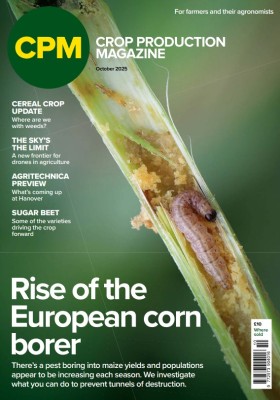As interest in biologically-based seed treatments ramps up, CPM finds out how Biolevel’s latest innovation, Gramax NP, is positioning itself as a proven performer with robust roots in science, collaboration and patience.
“There’s physics in farming. There’s chemistry. But biology? That’s the missing piece, the third leg of the stool.” LAURENCE BERMAN
By Charlotte Cunningham
It’s often said that the best agricultural innovations come from a deep understanding of the soil beneath our feet, and for Laurence Berman, that journey started not in a lab, but with a background in finance and real-estate…and a farm in the Cotswolds.
Laurence – alongside co-founder Lutz Glandorf – is the founder of Biolevel a company focused on bringing biology to the heart of conventional crop production. And while his path into farming isn’t a conventional one, he believes that’s actually proven to be a help, rather than a hindrance. “Coming into this space without preconceived notions gave me a fresh lens. My roots aren’t farming, but I’ve always been fascinated by systems, and agriculture is one of the most fundamental systems we rely on.”
Having worked in global markets from New York to Frankfurt, it was a move to a small farm near Chipping Norton that sparked the next chapter. “At the time, I was looking for something relevant – something that could genuinely make a difference. And all around me were conversations about soil health, regenerative practices, and the future of farming.”
AN OPPORTUNITY
That’s when a meeting with soil scientist Ian Robertson planted the seed for what would eventually become Biolevel. “There’s physics in farming – your plough, your machinery. There’s chemistry – fertiliser, sprays. But biology? That’s the missing piece, the third leg of the stool,” says Laurence.
“And, Ian made the point that while physics and chemistry had entire industries behind them, biology in agriculture [at the time] had been largely overlooked or underdeveloped.”
The duo set out with a bold vision: to create biological products that could match the reliability and practicality of chemistry. That meant stability, scalability, and above all, efficacy. “The vast majority of farming is still conventional,” explains Laurence. “So any biological product we developed had to fit into those systems – sprayable, storable, stable on seed, and robust enough to deliver under real-world conditions.”
While many biologicals sound promising in the lab, they can often fall short in the field, believes Laurence, and so Biolevel wanted to change that. “If a product can’t hold on seed, or can’t survive in the can, it’s dead on arrival – literally.”
The early days were all about R&D; Biolevel began trials in partnership with Wageningen University and Agrifirm, the largest farmer cooperative in the Netherlands. “We thought the first trials would get us quick traction,” Laurence admits. “But we quickly realised this was a life’s work.”
The company spent years refining its biological strains, optimising formulations, and building the proof base. “In this industry, you don’t get to launch a product after a season or two of decent data,” he says. “You need multiple years, multiple crops, and real-world results.”
That rigorous mindset laid the foundation for Gramax NP – a biological seed dressing now being rolled out across the UK. So what exactly is it and how does it work? At its core, Gramax NP is a multi-strain microbial seed treatment designed to enhance nutrient availability in the rhizosphere, promote root establishment, and support early vigour.
The development of Gramax NP has also been supported by an industry collaboration with Certis Belchim, who are now distributing the product in the UK after multiple years of trial work. Leanne Fowler, key account manager for seed treatment at Certis Belchim, believes there’s been a shift towards more growers seeking out biological options during recent years. “A few years ago, these kinds of products were often dismissed as snake oil. But now, as we lose chemistry, growers are looking to future-proof their systems. That means trialling and understanding alternative tools – while they still have a choice.”
It’s her belief that something like Gramax NP represents the next generation of microbial seed treatments – not just in name, but in performance and practicality.
“Gramax NP goes beyond nitrogen fixation,” she says. “It has eight strains of beneficial bacteria that work together throughout the plant’s growth stages. That includes solubilising phosphorus and potassium, delivering micronutrients, and supporting the plant from the ground up.”
TARGET MARKET
In terms of which growers it might suit, Gramax NP is approved for cereal crops and grasses – making it highly relevant for most arable systems across the UK. “There’s solid data behind it too,” says Leanne. “We’ve seen long-term trial work not only internally at Certis Belchim, but also via Biolevel and the independent team at Deben Agronomy. It backs up exactly what we’re saying.”
The efficacy of Gramax NP has been well-proven in laboratory, independent and commercial trials across the UK. Among these results, are a vast number of trials run independently by Deben Agronomy across the East of England, which suggest compelling outcomes. In its first year, Gramax NP delivered statistically significant yield increases over full fertilisation alone – meeting and exceeding the all-important 3:1 ROI benchmark, explains Laurence. “In subsequent years, we pushed it harder,” he adds. “We started reducing fertiliser – 10%, 20%, 30% – to test whether the biology could maintain performance. And it did.”
While most of the grower benefits are agronomic, there’s also a logistics story that might go unnoticed, but is no less important, continues Leanne. Unlike some biological seed treatments that require pre-mixing up to three days before application, Gramax NP is ready to use straight out of the can.
“It doesn’t require refrigeration, boasts a two-year shelf life, and remains viable on seed for up to a year – making it as user-friendly as it is agronomically sound. That might not be something a grower thinks about, but convenience shouldn’t be underestimated – it’s part of the value.”
She recalls a customer who, during a particularly busy season, had to go in over the weekend just to pre-mix a biological treatment ahead of a Monday application. “That kind of thing isn’t viable for long. Gramax NP removes that pain point.”
This article was taken from the latest issue of CPM. Read the article in full here.
For more articles like this, subscribe here.
Sign up for Crop Production Magazine’s FREE e-newsletter here.





